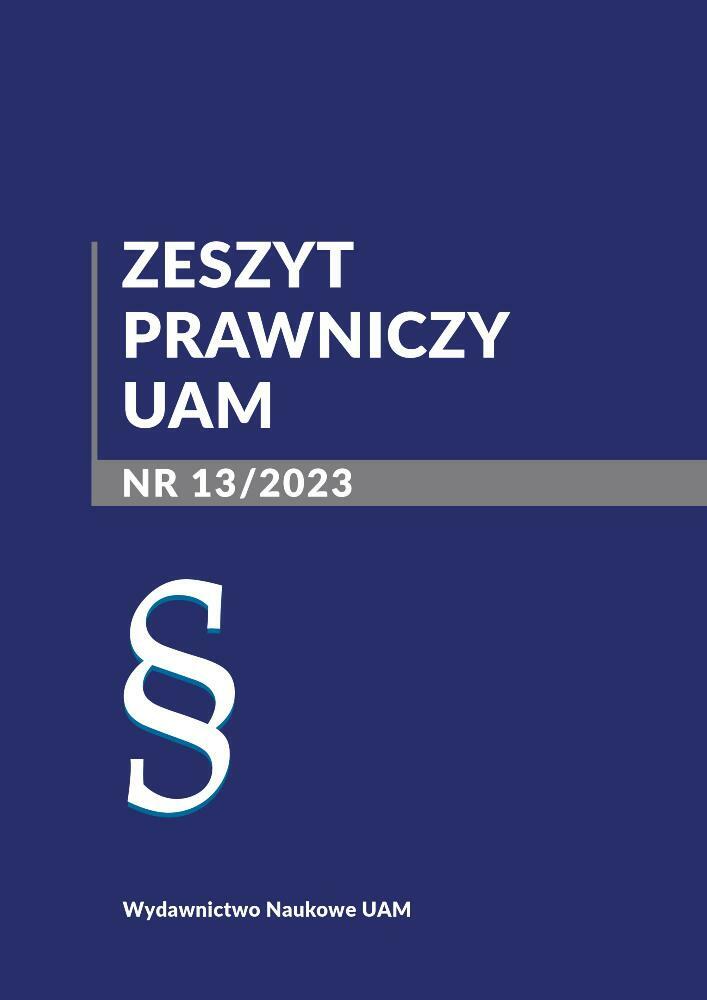Abstract
The long-awaited latest amendment to the Code of Commercial Companies that regulates holding law, should be subjected to a critical assessment, in which are helpful the principles of the Austrian school of economics. Analyzing the current act, comments and literature of the Austrian school, it can be seen that the regulation from Section IV of the Code of Commercial Companies contains many unnecessary and too intrusive provisions, at the same time including incomplete provisions. A remedy could be the introduction of an obligation to adopt a resolution by the shareholders’ meeting of companies included in the holding, in which the indicated issues would be individually regulated – such a solution would reflect the practical and dynamic nature of commercial law.
References
Czarnecka, A. (2022). Art. 4 § 1 pkt 4 lit. f, [w:] M. Baran, A. Czarnecka (red.), Prawo holdingowe. Praktyczny komentarz. Warszawa: 19–20.
Domański, G., Schubel, J. (2011). Krytycznie o projekcie prawa spółek. „Przegląd Prawa Handlowego” 5: 5–13.
Gołębiewski, S., Sędzicki, W. (2006). Koncerny w polskim systemie prawa. „Prawo Spółek” 3: 47–53.
Hayek, A.F. (1960). The Constitution of Liberty. Chicago.
Hayek, A.F. (2005). Droga do zniewolenia. Arcana.
Janik, M. (2014). Austriacka szkoła ekonomii i jej przedstawiciele. „Roczniki Ekonomii i Zarządzania” 6(2): 43–75.
Kachniewski, M., Rapala, R., Serowik, A. (2020). Doświadczenia państw Unii Europejskiej w stosowaniu regulacji prawa holdingowego, [w:] Nowelizacja KSH: prawo holdingowe w praktyce. Porównanie doświadczeń UE. Cykl webinariów w ramach X FSK, 20 października 2020 r. (zapis rozmowy).
Kirzner, I. (1978). Competition and Entrepreneurship. Chicago. DOI: https://doi.org/10.7208/chicago/9780226375489.001.0001
Łętowska, E., Woleński, J. (2013). Czy prawo zatruwa wolność? „Przegląd Filozoficzny. Nowa Seria” 3: 9–26.
Mises, L. (1998). Human Action. Auburn.
Mises, L. (2005). Biurokracja. Lublin.
Mroczek, A. (2016). Geneza społeczeństwa według austriackiej szkoły ekonomii w kontekście idei komunitarystycznych. „Prakseologia” 158(2): 297–321.
Oplustil, K. (2019). Koncepcje interesu grupy spółek w pracach europejskich gremiów eksperckich (EMCA, FECG, ICLEG). „Ruch Prawniczy, Ekonomiczny i Socjologiczny” 1: 5–25. DOI: https://doi.org/10.14746/rpeis.2019.81.1.1
Radwan, A. (2006). Przymusowy wykup akcji drobnych akcjonariuszy w świetle stanowiska Trybunału Konstytucyjnego, [w:] J. Frąckowiak (red.), Kodeks spółek handlowych po pięciu latach. Wrocław: 574–593.
Rothbard, M. (1998). The Ethics of Liberty. New York.
Rothbard, M. (2004). Man, Economy, and State with Power and Market. Auburn.
Schumpeter, J. (1960). Teoria rozwoju gospodarczego. Warszawa.
Simpson, D. (1983). Joseph Schumpeter and Austrian School of Economics. „Journal of Economic Studies” 10(4): 18–28. DOI: https://doi.org/10.1108/eb002567
Sołtysiński, S. (1993). Zgrupowanie spółek. Zarys problematyki prawnej. „Kwartalnik Prawa Prywatnego” 3: 230–235.
Stępnicka, N. (2013). Koncepcja twórczej destrukcji J.A. Schumpetera a wyzwania współczesnej gospodarki. „Studia Ekonomiczne” 129: Współczesne problemy ekonomiczne: wybrane zagadnienia teoretyczne a praktyka gospodarcza: 28–34.
Szymański, K.M., Ośka, J. (2022/2023). Nowelizacja KSH – przyczyny zmian oraz najważniejsze wprowadzone rozwiązania. „Edukacja Prawnicza” 1: 35–45.
License
Copyright (c) 2023 Wiktor Dolata

This work is licensed under a Creative Commons Attribution 4.0 International License.

